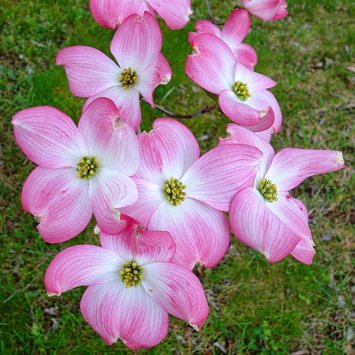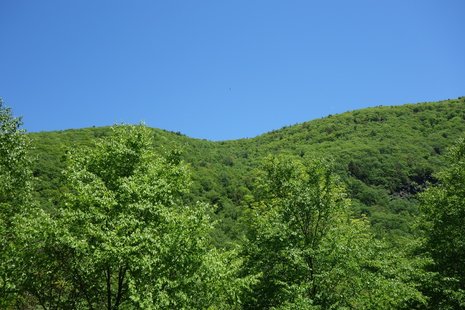|
Most years, when winter has waned and spring has sprung, I resume my (almost) daily walks. This year I had some additional motivation to start. On New Year's Day I committed myself to a 365 photo challenge: to take and post a new picture every day of the year 2017. Once the walks returned, meeting the challenge was easy. Late winter and early spring flowers start the show. Soon trees are budding and blossoming. Tulips, daffodils, and iris dominate mid-spring. Finally, roses, clematis, and lilies oblige the photographer. Recently, at the beginning of the second week in June, I was halfway through my walk when I realized I had not snapped a single photo. The spring riot of colors was reduced to a murmur. Green dominated. My first reaction to this was a twinge of sadness. The situation quickly triggered a Robert Frost poem that I had taught many times to my students over the years: Nature's first green is gold, Her hardest hue to hold. Her early leaf's a flower; But only so an hour. Then leaf subsides to leaf. So Eden sank to grief, So dawn goes down to day. Nothing gold can stay. The poem and the lack of color other than green got me to thinking. At two thirds of a century, am I watching the dawn go down to day, as Frost would have it? Has the best--gold, Eden--passed? I have nothing against summer. It is a beautiful season in its own right, but for me it can't hold a candle to spring or fall. Aha moment! (Cue the lightbulb over my head!) The green is necessary to produce the next round of gold. Autumn foliage is by far my favorite thing to photograph. If I want to shoot in the fall, I must accept and embrace the green of summer. The color will return, just in a different form. Frost’s poem seems to tell us that beauty is fleeting, temporal, ephemeral. Enjoy it because it won't last. He gets in John Keat’s face, who boldly claimed that beauty had a lot more staying power than Eden: "Beauty is truth, truth beauty,—that is all Ye know on earth, and all ye need to know." Robert Frost won four Pulitzer prizes for poetry. Keats is, well, he’s Keats! These are heavyweight thinkers and artists. But when it comes to the seasons of my life, I’m going with The Chairman of the Board, Old Blue Eyes, Frank Sinatra: The best is yet to come... We've only tasted the wine. We're gonna drain that cup dry. And so it is with my life. The beauty of truth may get scarred. The gold may be lacking at times. But they will come back. And life will be better. (c) 2017 Larry Pizzi
0 Comments
In the early 1980s I was an Army officer assigned to the faculty of the United States Military Academy at West Point. I taught writing to college freshman and literature to juniors. One of my colleagues in our shared office was a young major, a year or so ahead of me in rank. He was a hard-core combat arms officer who taught, of all things, philosophy. He was one of the most personable and most intelligent people I've ever met. He once wrote an article in which he proposed that one of the most important things a senior leader could practice was repose: time for calm and quiet reflection. This was a bit of a departure from the notion that combat officers were men of constant action. (Sorry ladies, but in those days, only men could be members of the combat arms branches.) He was serious, despite the good-natured ribbing and sarcasm from some of his peers and superiors. Navel-gazing they called it. He was never bothered by the comments and usually answered the criticism with a smile. That young major rose through the ranks to become a four-star general. In 2011, President Obama chose and the U.S. Senate unanimously confirmed him as the 18th Chairman of the Joint Chiefs of Staff. This is the highest position possible for any officer of any branch of service. However small, a part of what took him to this height was a belief in the importance of silent reflection. On a slightly less momentous level, my wife and I the have also learned the value of silence and reflection in our marriage of 42 years. It seems that we are both aptly described by Juliet, the protagonist of the novel The Guernsey Literary and Potato Peel Pie Society. She writes to a close female friend expressing frustration with her lack of a husband. As she vents, she notes, “I can't think of anything lonelier than spending the rest of my life with someone I can't talk to, or worse someone I can't be silent with.” (emphasis mine) My wife and I have one constant in our otherwise variable days. We call it happy hour. We set aside an hour or so before dinner during which we reconnect, she, with her “cocktail” of orange juice and seltzer and I with an extra dry martini. It is no exaggeration to say that this is a sacred time for us, a time for nothing else but each other. Most of these times involve a review of the day or plans for tomorrow. Occasionally we allow each other a forum to vent frustrations. More often, we just share bits of news or feelings. Sometimes, though, we sit in silence. It’s not an awkward silence but a silence in which we are still connected, even still communicating. More than once, one of us has broken that silence to hear the other say something like “I was thinking the same thing. For a few minutes each day, my wife and I intentionally communicate in quiet conversation. Sometimes that conversation is silent. That silence is perhaps the most intimate communication of the day. These days it's easy to suffer from sensory overload. It spills into and sometimes even defines our relationships. We live in a world where nearly half the global population has the ability to share anything, discreet or innocent, true or false, self-serving or helpful, with the rest of mankind. In 2013 nearly 86% of people on earth had access to a cell phone. Fewer than 65% had access to a working toilet. Legendary news anchor Dan Rather once interviewed Mother (now Saint) Teresa of Kolkata. As only she could, she expressed profound truth with a wink and a grin, catching the interviewer off guard. Rather asked, "What do you say to God when you pray?" "Nothing," replied Mother Theresa. "I just listen." "What does God say to you?" he responded, rather derisively. "Nothing," replied Mother Theresa. "He just listens." Seems like the highest ranking officer in the United States armed forces and the servant nun (who was also a Nobel Peace Prize laureate) had something in common. And they were both right. (c) 2017 Larry Pizzi
|
Larry Pizzi50 years of photographs and 35 years of keeping a commonplace book. Archives
March 2018
Categories |








 RSS Feed
RSS Feed